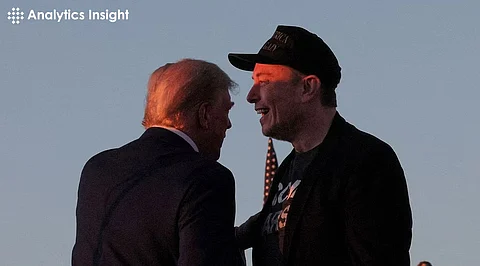

As we enter 2025, the world is on the verge of an AI revolution that will transform industries, economies, and our daily lives. Two influential figures, Elon Musk and Donald Trump, are expected to play pivotal roles in shaping this transformation.
As a pioneer in tech innovation, Musk is set to leverage his expertise to drive progress, while Trump's policy-driven approach may also impact the trajectory of AI adoption.
Renowned leader in AI technology, Elon Musk, is the head of Tesla, SpaceX, and Neuralink. He is known for overcoming challenges that seem impossible, believing he can transcend any barrier. According to him, AI will serve as a foundation for technologies that enable people to solve deep-seated, long-term problems.
Most importantly, Musk would have contributed to AI through his company, Neuralink, focused on the technology of a brain-computer interface. From that idea, Neuralink may provide the possibility of a direct interface between the human brain and machines, revolutionizing AI to provide a more natural way of communicating between humans and computers. Maybe, by 2025, AI will become part of Musk's life through wearable technologies or even brain implants, thus enhancing the capability of artificial intelligence while making it more accessible and efficient.
Musk has talked a lot about the risks of uncontrolled AI development. He has constantly cautioned against threats that may emerge if AI leaves human control and has advocated that rules be in place to ensure that AI systems do not drift further from human needs. He will provide the framework of the discussion for 2025 on global ethics of AI and safeguards due to the pervasive usage of AI in areas as important as health care, autonomous automobiles, and even space exploration.
On the contrary, Donald Trump feels AI is very policy- and regulation-based. As a former president of the United States, he ensured that America stayed ahead in terms of technology. By 2025, this influence will show in policies that ensure the United States will be ahead of the pack in this burgeoning field. These will be supported by competitive advantages, national security, and economic growth, which will provide impetus to the development of AI technology across military applications, cybersecurity, and data privacy.
Under President Trump's administration, the pursuit of artificial intelligence research has increased because of the huge investment in AI-based national defense and cybersecurity initiatives. A large amount of AI technology is going to be poured into military-grade AI technology that will probably bring breakthroughs in unmanned vehicles, surveillance systems, and autonomous defense mechanisms- all of which are going to be part of AI as a national security asset.
On the other hand, the rhetoric on deregulation and a business-friendly environment may be used to fuel private sector innovation in AI. With less regulatory burden, the tech companies will be forced to push the limits of what AI can do, which may fast-track this transformational technology. This environment would encourage the proliferation of AI-enabled tools across sectors, from finance to healthcare, and AI into the very fabric of the economy.
From different angles, what might emerge from the combination of Musk and Trump in 2025 is a synergy that would accelerate AI development. The innovative advancements made by Musk would be supported by the regulatory framework put in place by Trump, which would provide an environment ready for rapid development while mitigating potential risks. The vast reach of Musk's efforts in AI-related sectors, such as autonomous vehicles and space exploration, can find support in Trump's advocacy for AI policies that support infrastructure development, funding, and research.
More importantly, Musk is setting the trend globally in electric vehicles and space exploration. His ability to attract investments and shape the future of industries through AI may push other nations to do the same, thus starting a global AI race. In this regard, Trump's policies are an attempt to solidify American dominance in AI, thus keeping the U.S. at the forefront of innovation.
The warnings made by Musk about the possibility of AI becoming uncontrollable align with the interest of Trump in ensuring that AI remains a means of positive social change. Both figures may become part of a global framework that would establish standards for AI governance in 2025, seeing that AI technologies are developed responsibly for the betterment of humanity.
The future of artificial intelligence in 2025 hinges on the synergy between Elon Musk's technological vision and Donald Trump's policy landscape. Musk's pioneering work in brain-computer interfaces and AI-driven systems is poised to revolutionize various sectors and redefine the human-machine dynamic.
Meanwhile, Trump's focus on national security and economic growth will likely provide the regulatory framework needed for AI to flourish. As their influences converge, AI is expected to emerge as a powerful driver of innovation, economic development, and social progress.
However, it's worth noting that Musk's concerns about AI's potential risks to humanity might also shape the policy discussion. Ultimately, the intersection of Musk's technological expertise and Trump's policy agenda will define the trajectory of AI in 2025.
